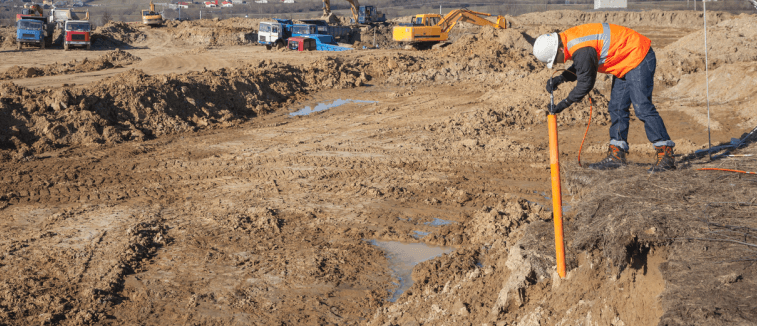Unknown Facts About Geotheta
Unknown Facts About Geotheta
Blog Article
Not known Facts About Geotheta
Table of Contents10 Easy Facts About Geotheta ShownSome Known Details About Geotheta Geotheta Can Be Fun For EveryoneThe smart Trick of Geotheta That Nobody is Talking AboutGetting The Geotheta To Work

They carry out site examinations, gather examples, do research laboratory examinations, and analyze information to examine the suitability of the ground for building tasks - Tailings Engineer. Based upon their findings, geotechnical designers supply referrals for structure style, slope security, keeping structures, and mitigation of geotechnical risks. They team up with various other professionals, such as designers, architectural designers, and building groups, to guarantee that geotechnical factors to consider are integrated into the overall project design and execution
By evaluating the habits and residential properties of dirt and rock, they can recognize prospective geotechnical hazards such as landslides, soil negotiation, or slope instability. Their competence aids protect against failures or mishaps that might endanger lives and building. Here are some in-depth tasks and obligations of a geotechnical engineer: Site Examination: Geotechnical designers conduct website examinations to collect data on subsurface problems.
They analyze the data to understand the homes and habits of the soil and rock, including their stamina, leaks in the structure, compaction qualities, and groundwater conditions. Geotechnical Evaluation and Style: Geotechnical engineers evaluate the data accumulated during website examinations to evaluate the stability and suitability of the site for building and construction projects. They execute geotechnical computations and modeling to evaluate elements such as birthing capacity, settlement, slope stability, side planet pressures, and groundwater flow.
The Facts About Geotheta Uncovered
Foundation Style: Geotechnical engineers play an essential role in developing structures that can safely support the desired structure. They evaluate the soil problems and tons requirements to identify the ideal structure type, such as shallow structures (e.g., footings), deep structures (e.g (https://gravatar.com/exactlypainterdeb7b76e1a)., heaps), or specialized strategies like soil enhancement. They think about factors such as settlement limits, birthing capacity, and soil-structure communication to establish optimum structure designs
They evaluate construction plans, screen site tasks, and perform area assessments to confirm that the style referrals are adhered to. If unforeseen geotechnical issues develop, they assess the situation and give suggestions for removal or modifications to the style. Threat Analysis and Mitigation: Geotechnical engineers analyze geotechnical risks and risks related to the job site, such as landslides, liquefaction, or soil disintegration.

Cooperation and Interaction: Geotechnical engineers work closely with various other professionals associated with a project, such as architects, architectural engineers, and building and construction teams. Effective communication and partnership are necessary to incorporate geotechnical considerations right into the overall project layout and building process. Geotechnical designers offer technological know-how, response inquiries, and make sure that geotechnical needs are fulfilled.
Geotheta Things To Know Before You Buy
Below are some sorts of geotechnical engineers: Foundation Engineer: Foundation designers focus on making and assessing foundations for frameworks. They assess the soil conditions, lots requirements, and website characteristics to figure out the most proper structure type and design, such as shallow structures, deep foundations, or specialized methods like stack foundations.
They evaluate the aspects influencing incline security, such as soil buildings, groundwater conditions, and incline geometry, and establish strategies to avoid incline failures and minimize dangers. Earthquake Engineer: Earthquake engineers focus on analyzing and making structures to endure seismic pressures. They assess the seismic danger of a website, assess soil liquefaction capacity, and create seismic design standards to make sure the security and strength of frameworks during earthquakes.
They perform area testing, accumulate examples, and evaluate the gathered information to identify the dirt residential properties, geologic formations, and groundwater problems at a site. Geotechnical Instrumentation Engineer: Geotechnical instrumentation engineers concentrate on surveillance and gauging the habits of dirt, rock, and frameworks. They install and preserve instrumentation systems that check aspects such as dirt negotiation, groundwater degrees, slope movements, and architectural variations to analyze performance and give early cautions of potential concerns.
Some Known Questions About Geotheta.
They conduct tests such as triaxial tests, debt consolidation tests, straight shear examinations, and permeability examinations to collect data for geotechnical analysis and design. Geosynthetics Engineer: Geosynthetics engineers focus on the style and application of geosynthetic materials, such as geotextiles, geogrids, and geomembranes. They make use of these products to improve dirt stability, enhance inclines, provide water drainage services, and control disintegration.
They tend to be investigative individuals, which indicates they're intellectual, reflective, and investigative. They are curious, methodical, sensible, logical, and rational. Some of them are likewise social, suggesting they're kind, generous, cooperative, individual, caring, useful, compassionate, tactful, and pleasant - Consulting Engineers.
In the workplace setting, geotechnical find out here now designers make use of specialized software tools to do computations, create layouts, and evaluate information. They prepare reports, evaluation job specs, communicate with customers and group members, and coordinate project activities. The workplace setup offers a conducive atmosphere for research, evaluation, and partnership with various other specialists entailed in the project.
Geotheta - Truths
They frequently check out project sites to conduct site investigations, assess geotechnical conditions, and gather data for analysis. These brows through entail taking a trip to different areas, sometimes in remote or tough terrains. Geotechnical designers may carry out soil sampling, conduct tests, and monitor construction activities to ensure that the geotechnical aspects of the project are being carried out appropriately.
Geotechnical engineers also operate in specialized geotechnical laboratories. In these centers, they carry out experiments, execute examinations on soil and rock examples, and analyze the design residential or commercial properties of the products. Geotechnical lab engineers function thoroughly in these environments, handling screening tools, operating tools, and recording information. They work together with various other lab personnel to make sure accurate and trustworthy testing results.
Report this page